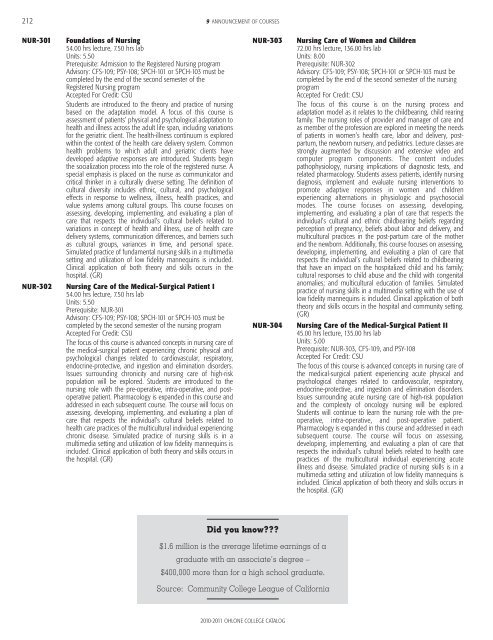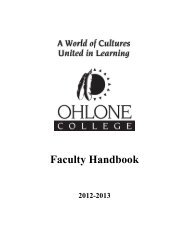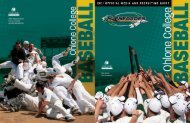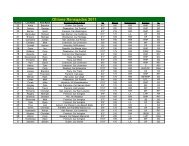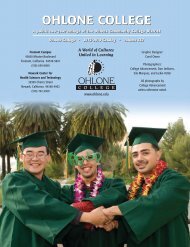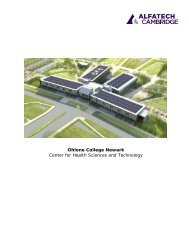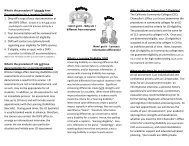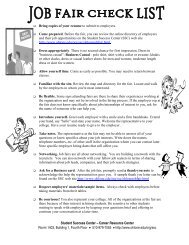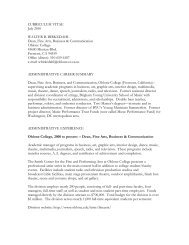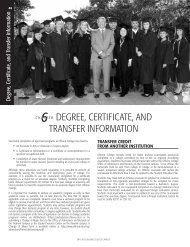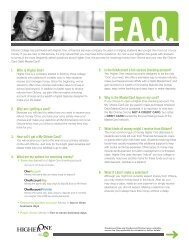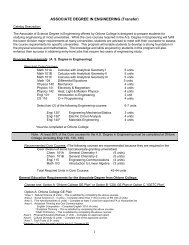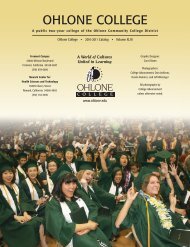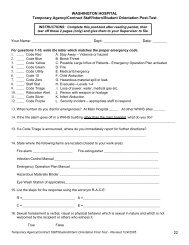2010-2011 Catalog (all pages) - Ohlone College
2010-2011 Catalog (all pages) - Ohlone College
2010-2011 Catalog (all pages) - Ohlone College
You also want an ePaper? Increase the reach of your titles
YUMPU automatically turns print PDFs into web optimized ePapers that Google loves.
212 9 ANNOUNCEMENT OF COURSES<br />
NUR-301<br />
NUR-302<br />
Foundations of Nursing<br />
54.00 hrs lecture, 7.50 hrs lab<br />
Units: 5.50<br />
Prerequisite: Admission to the Registered Nursing program<br />
Advisory: CFS-109; PSY-108; SPCH-101 or SPCH-103 must be<br />
completed by the end of the second semester of the<br />
Registered Nursing program<br />
Accepted For Credit: CSU<br />
Students are introduced to the theory and practice of nursing<br />
based on the adaptation model. A focus of this course is<br />
assessment of patients’ physical and psychological adaptation to<br />
health and illness across the adult life span, including variations<br />
for the geriatric client. The health-illness continuum is explored<br />
within the context of the health care delivery system. Common<br />
health problems to which adult and geriatric clients have<br />
developed adaptive responses are introduced. Students begin<br />
the socialization process into the role of the registered nurse. A<br />
special emphasis is placed on the nurse as communicator and<br />
critical thinker in a cultur<strong>all</strong>y diverse setting. The definition of<br />
cultural diversity includes ethnic, cultural, and psychological<br />
effects in response to wellness, illness, health practices, and<br />
value systems among cultural groups. This course focuses on<br />
assessing, developing, implementing, and evaluating a plan of<br />
care that respects the individual’s cultural beliefs related to<br />
variations in concept of health and illness, use of health care<br />
delivery systems, communication differences, and barriers such<br />
as cultural groups, variances in time, and personal space.<br />
Simulated practice of fundamental nursing skills in a multimedia<br />
setting and utilization of low fidelity mannequins is included.<br />
Clinical application of both theory and skills occurs in the<br />
hospital. (GR)<br />
Nursing Care of the Medical-Surgical Patient I<br />
54.00 hrs lecture, 7.50 hrs lab<br />
Units: 5.50<br />
Prerequisite: NUR-301<br />
Advisory: CFS-109; PSY-108; SPCH-101 or SPCH-103 must be<br />
completed by the second semester of the nursing program<br />
Accepted For Credit: CSU<br />
The focus of this course is advanced concepts in nursing care of<br />
the medical-surgical patient experiencing chronic physical and<br />
psychological changes related to cardiovascular, respiratory,<br />
endocrine-protective, and ingestion and elimination disorders.<br />
Issues surrounding chronicity and nursing care of high-risk<br />
population will be explored. Students are introduced to the<br />
nursing role with the pre-operative, intra-operative, and postoperative<br />
patient. Pharmacology is expanded in this course and<br />
addressed in each subsequent course. The course will focus on<br />
assessing, developing, implementing, and evaluating a plan of<br />
care that respects the individual’s cultural beliefs related to<br />
health care practices of the multicultural individual experiencing<br />
chronic disease. Simulated practice of nursing skills is in a<br />
multimedia setting and utilization of low fidelity mannequins is<br />
included. Clinical application of both theory and skills occurs in<br />
the hospital. (GR)<br />
NUR-303<br />
NUR-304<br />
Nursing Care of Women and Children<br />
72.00 hrs lecture, 136.00 hrs lab<br />
Units: 8.00<br />
Prerequisite: NUR-302<br />
Advisory: CFS-109; PSY-108; SPCH-101 or SPCH-103 must be<br />
completed by the end of the second semester of the nursing<br />
program<br />
Accepted For Credit: CSU<br />
The focus of this course is on the nursing process and<br />
adaptation model as it relates to the childbearing, child rearing<br />
family. The nursing roles of provider and manager of care and<br />
as member of the profession are explored in meeting the needs<br />
of patients in women’s health care, labor and delivery, postpartum,<br />
the newborn nursery, and pediatrics. Lecture classes are<br />
strongly augmented by discussion and extensive video and<br />
computer program components. The content includes<br />
pathophysiology, nursing implications of diagnostic tests, and<br />
related pharmacology. Students assess patients, identify nursing<br />
diagnosis, implement and evaluate nursing interventions to<br />
promote adaptive responses in women and children<br />
experiencing alternations in physiologic and psychosocial<br />
modes. The course focuses on assessing, developing,<br />
implementing, and evaluating a plan of care that respects the<br />
individual’s cultural and ethnic childbearing beliefs regarding<br />
perception of pregnancy, beliefs about labor and delivery, and<br />
multicultural practices in the post-partum care of the mother<br />
and the newborn. Addition<strong>all</strong>y, this course focuses on assessing,<br />
developing, implementing, and evaluating a plan of care that<br />
respects the individual’s cultural beliefs related to childbearing<br />
that have an impact on the hospitalized child and his family;<br />
cultural responses to child abuse and the child with congenital<br />
anomalies; and multicultural education of families. Simulated<br />
practice of nursing skills in a multimedia setting with the use of<br />
low fidelity mannequins is included. Clinical application of both<br />
theory and skills occurs in the hospital and community setting.<br />
(GR)<br />
Nursing Care of the Medical-Surgical Patient II<br />
45.00 hrs lecture, 135.00 hrs lab<br />
Units: 5.00<br />
Prerequisite: NUR-303, CFS-109, and PSY-108<br />
Accepted For Credit: CSU<br />
The focus of this course is advanced concepts in nursing care of<br />
the medical-surgical patient experiencing acute physical and<br />
psychological changes related to cardiovascular, respiratory,<br />
endocrine-protective, and ingestion and elimination disorders.<br />
Issues surrounding acute nursing care of high-risk population<br />
and the complexity of oncology nursing will be explored.<br />
Students will continue to learn the nursing role with the preoperative,<br />
intra-operative, and post-operative patient.<br />
Pharmacology is expanded in this course and addressed in each<br />
subsequent course. The course will focus on assessing,<br />
developing, implementing, and evaluating a plan of care that<br />
respects the individual’s cultural beliefs related to health care<br />
practices of the multicultural individual experiencing acute<br />
illness and disease. Simulated practice of nursing skills is in a<br />
multimedia setting and utilization of low fidelity mannequins is<br />
included. Clinical application of both theory and skills occurs in<br />
the hospital. (GR)<br />
Did you know???<br />
$1.6 million is the average lifetime earnings of a<br />
graduate with an associate’s degree –<br />
$400,000 more than for a high school graduate.<br />
Source: Community <strong>College</strong> League of California<br />
<strong>2010</strong>-<strong>2011</strong> OHLONE COLLEGE CATALOG


